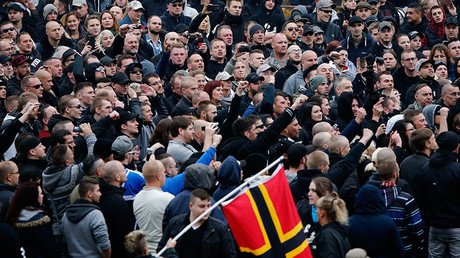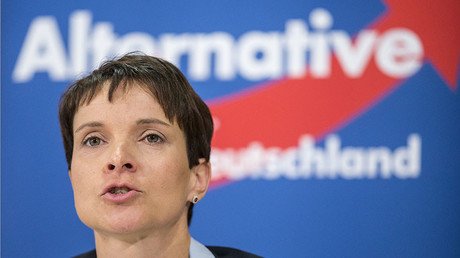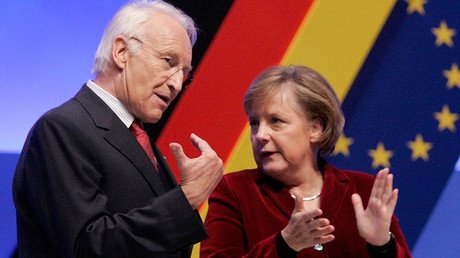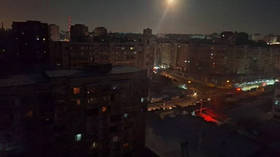Anti-immigrant AfD comes in third in German local elections, mainstream parties ‘terrified’
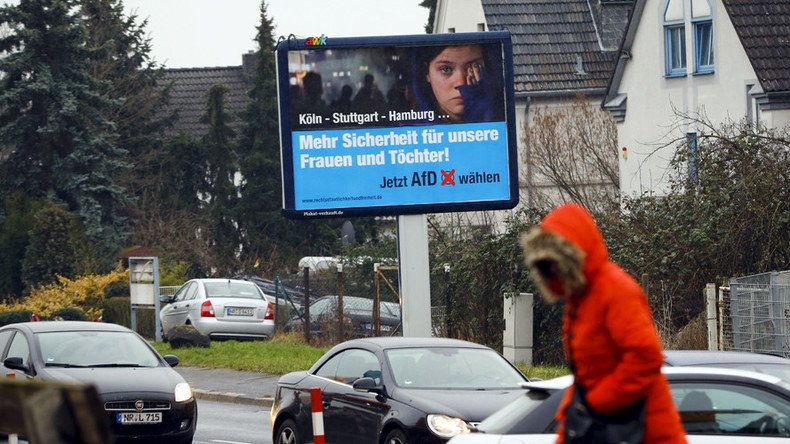
The anti-immigrant right-wing Alternative for Germany party (AfD) scored huge gains in local elections in the German central state of Hessen over the weekend, becoming the third strongest political force in the region amid the ongoing refugee crisis.
The anti-immigrant party garnered on average of 13.2 percent of vote throughout the region, coming in behind only Chancellor Angela Merkel’s Christian Democrats (CDU), which received 28.2 percent, and the Social Democrats (SPD) with 28 percent, according to preliminary election results, as reported by the German media.
AfD also scored significant gains in Hessen’s several major cities, winning 10.3 percent in Frankfurt, 12.2 percent both in Kassel and Darmstadt, as well as enjoying particular success in the regional capital of Wiesbaden, attracting 15.3 percent of the vote.
At the same time, both CDU and SPD, which are Germany’s largest parties, lost a significant share of voter support when compared to previous local elections, with a reduction of 5.5 and 3.5 percent, respectively, German media report.
Local elections in Hessen came just a week before regional elections in three other German states – Saxony-Anhalt, Rhineland-Pfalz, and Baden-Wurttemberg. The latest opinion polls show that AfD could win 12.5 percent in Baden-Wurttemberg, 9 percent in Rhineland-Pfalz, and as much as 19 percent in Saxony-Anhalt, Suddeutsche Zeitung reports.
The preliminary tallies were based on counting 60 percent of the votes throughout the region and are not final, Matthias Jung, a co-chair of the Forschungsgruppe Wahlen, a German elections research center, told Frankfurter Allgemeine Zeitung, adding that the results have yet to undergo readjustment in accordance with the German local election system, which could alter the final outcome.
‘Frightening result’
In the meantime, AfD’s smashing success has already provoked grave concern among many mainstream politicians, who fear the rise of right-wing populism and even far-right movements amid the unending refugee crisis.
“AfD’s preliminary result is frightening. I had expected a maximum of five percent,” Markus Frank, a Frankfurt politician from the CDU, told Journal Frankfurt.
His words were echoed by the vice-chair of the SPD faction in the German parliament, Eva Hogl, who also called the AfD’s result “terrifying,” adding that “if [AfD] enters the state parliaments with double digits and maybe even the federal parliament, this will change the whole German community in a very negative way,” Frankfurter Allgemeine Zeitung reports.
“Mainstream parties are paying the price for the voters’ protest,” CDU’s regional secretary general in Hessen, Manfred Pentz, told Suddeutsche Zeitung, adding that AfD is benefiting from anti-immigrant backlash.
Meanwhile, AfD politicians celebrated their party’s success, pointing out that mainstream German parties are losing support. “The power of the mainstream parties is fading,” Frauke Petry, the chairwoman of the AfD, told journalists when commenting on the latest local election results.
AfD was founded in 2013 as a Eurosceptic party fighting mainly to dismantle the single European currency system, but then took a more right-wing stance, making immigration its program’s number one issue.
The party’s previous best election result, which claimed 12.2 percent of the vote, occurred in the eastern German state of Brandenburg in 2014. The party is traditionally less popular in Western Germany, where it has long struggled to overcome the five percent threshold in regional elections, seeing its best result of 6.1 percent in Hamburg in 2015.
Frauke Petry, the party’s leader, provoked a wave of indignation in late January when she said that police should have the right to shoot refugees and migrants to prevent them from crossing German border, though calling such measure “the last resort.”
However, despite the outrage, 29 percent of Germans agreed with Petry’s proposal, according to a YouGov opinion poll conducted just days after she made her provocative statement, as cited by Die Welt.
Neo-Nazis come with double-digit results in several towns
Meanwhile, the preliminary election results also showed that the neo-Nazi National Democratic Party of Germany (NPD) managed to win 17 percent of the vote in the state of Hessen’s town of Leun, which has a population of 6,000 people. It also took 14 percent of the ballots in Budingen, a town with 21,000 residents, which hosts the largest refugee center in Hessen, The Local reports.
NPD also scored significant election gains in Budingen, capitalizing on the refugee crisis to win an extra 12 percent of the vote compared to the previous local election, when the neo-Nazis took only two percent there.
About a million migrants and refugees entered Germany last year, which has led to the rise of various right and far-right movements. The country has witnessed a growing number of anti-migration rallies, as well as attacks on refugee facilities since the beginning of the crisis.
